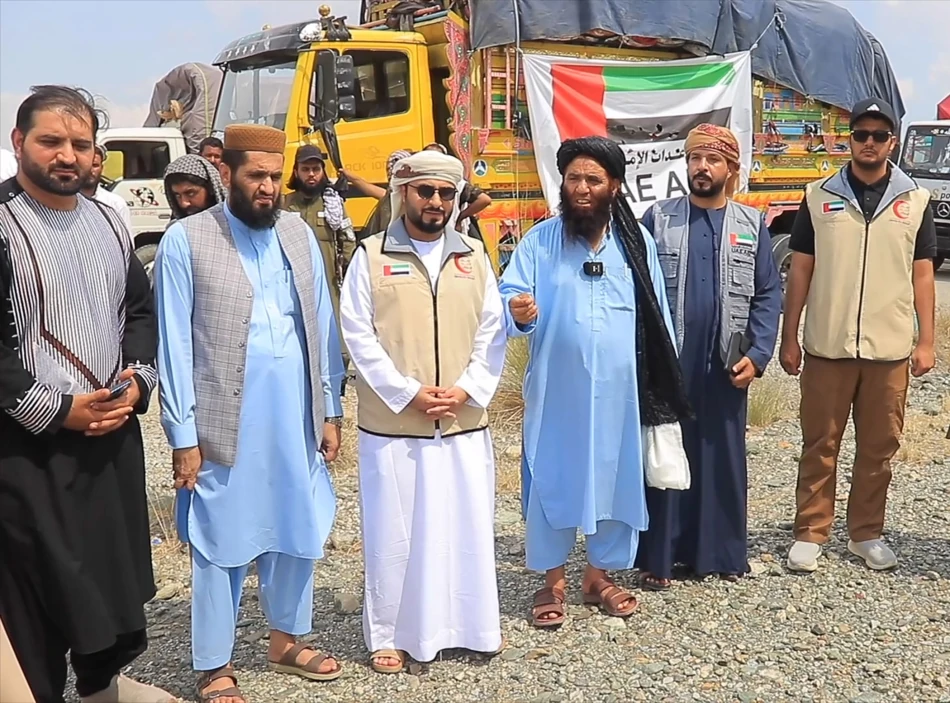
Afghan People Express Gratitude to UAE for Earthquake Relief Efforts
UAE Emerges as Key Humanitarian Partner for Afghanistan After Devastating Earthquake
The United Arab Emirates has positioned itself as a critical lifeline for earthquake-stricken Afghanistan, delivering essential aid that underscores the Gulf nation's growing humanitarian influence in the region. As rescue teams continue pulling survivors and bodies from rubble, Afghan officials and survivors are expressing profound gratitude for UAE's swift response to a disaster that has claimed hundreds of lives and left thousands homeless.
Swift Response Highlights UAE's Regional Strategy
The UAE's immediate humanitarian intervention reflects a calculated approach to soft diplomacy in Afghanistan, where international engagement remains complex following the Taliban's return to power in 2021. By working directly with UN organizations and local Afghan institutions, the Emirates has found a pathway to provide critical assistance while navigating the challenging political landscape.
Maulvi Abdul Ghafoor, a food supply coordinator in affected areas, praised the UAE's multi-faceted relief efforts, noting that the assistance "reflects the spirit of genuine Islamic brotherhood." The aid package includes everything from clean water to blankets, targeting all affected demographic groups.
Survivors Paint Grim Picture of Destruction
Villages Decimated in Pre-Dawn Strike
Alam Gul, a resident of Shoki district, described the earthquake's terrifying impact: "The earthquake struck just before midnight. We found ourselves buried under debris, and it felt like Judgment Day." His account reveals the complete devastation—no shelter, no food, and rescue operations still ongoing as teams extract both survivors and bodies from collapsed structures.
The human toll continues mounting across affected regions. Abdul Basir Sabet, another Shoki resident, reported his village alone lost at least 103 lives. "I don't even have the strength to speak," he said, describing families sleeping in open fields and desperately needing tents and basic necessities.
Death Toll Climbs Across Multiple Districts
In Dara Diwagul district, resident Gul Rahim confirmed approximately 80 deaths in his village while expressing gratitude for UAE aid shipments. His message to the international community was stark: "We are going through a major crisis. We have no homes, no basic life necessities. We need help."
Healthcare System Struggles Under Pressure
Dr. Shafiullah Ahmadzai, Deputy Director of Public Health in Kunar Province, highlighted the ongoing medical crisis. "Our country is poor and our people are suffering," he stated, emphasizing that earthquake impacts remain catastrophic and survivors need diverse assistance to rebuild their lives effectively.
The healthcare official's comments underscore Afghanistan's broader challenges—a struggling economy, limited infrastructure, and international isolation that has complicated traditional aid channels since 2021.
Geopolitical Implications of UAE's Aid Strategy
The UAE's prominent role in Afghanistan's earthquake response demonstrates how Gulf states are filling humanitarian gaps left by reduced Western engagement. This approach mirrors the Emirates' broader strategy of maintaining practical relationships across the Middle East and South Asia, regardless of political complications.
Unlike more conditional aid programs, the UAE's direct assistance model appears designed for maximum impact and minimal bureaucratic delays—a crucial factor when dealing with natural disasters. This pragmatic approach may serve as a template for other nations seeking to provide humanitarian assistance in politically complex environments.
As Afghanistan continues grappling with economic isolation and limited international recognition, the UAE's sustained humanitarian engagement signals a potential pathway for addressing urgent human needs while broader political questions remain unresolved.
Most Viewed News

 Sara Khaled
Sara Khaled






